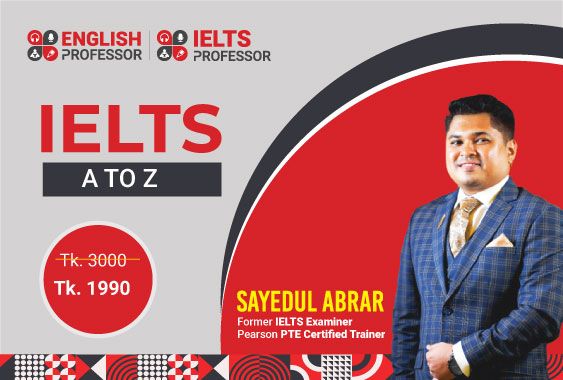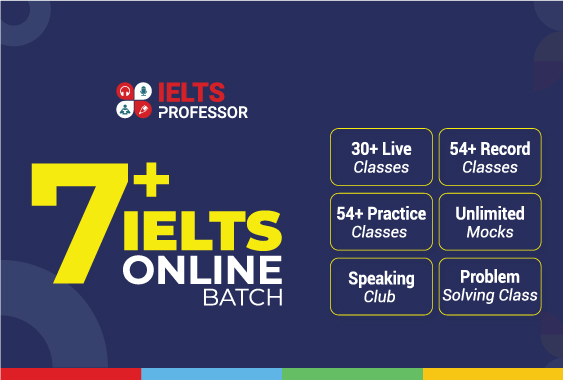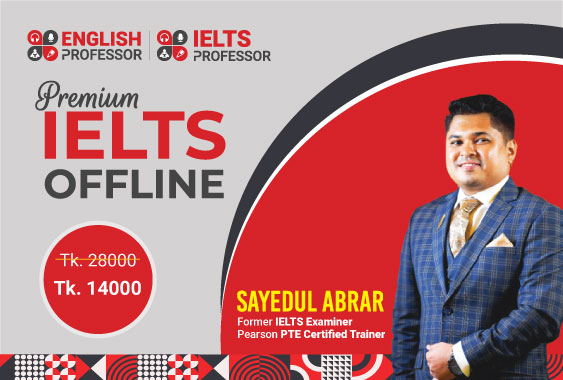
The International English Language Testing System (IELTS) is
widely recognized as one of the most significant qualifications for anyone
pursuing higher education or professional advancement abroad. For Bangladeshi
students, mastering the IELTS exam has become a key to unlocking opportunities,
not only within Bangladesh but across the globe. The global demand for
individuals with strong English language skills, especially in business,
education, and technology sectors, has created a compelling reason for students
to prioritize IELTS preparation. Whether seeking to study in prestigious
universities in the US, UK, Australia, or Canada, or aiming for better job
prospects, IELTS plays a pivotal role in shaping the career trajectory of many
individuals in Bangladesh.
In Bangladesh, English is often seen as a symbol of
education and opportunity. As the country continues to grow economically and
expand its presence in the global market, the ability to communicate
effectively in English has become indispensable. For students, IELTS offers a
structured and reliable way to demonstrate proficiency in English, a
requirement for both academic and professional success. The growth of
international universities, multinational companies, and a growing number of
foreign embassies in Dhaka means that more students are competing for
opportunities abroad. As such, IELTS has emerged as a gateway to success,
offering Bangladeshi students the chance to improve their career prospects both
locally and internationally.
Despite the clear advantages, many Bangladeshi students face challenges when preparing for and taking the IELTS exam. From financial constraints to cultural barriers, the journey toward achieving a high score on the IELTS can be daunting. However, with the right mindset, preparation, and support, many students have been able to overcome these challenges and achieve their career goals.
The Growing Importance of IELTS in Bangladesh
In Bangladesh, IELTS has become more than just an academic
requirement—it’s a strategic tool for career growth. As global competition
increases, Bangladeshi students are more aware of the importance of English
proficiency in their future career paths. With English being the dominant
language in the fields of business, science, and technology, IELTS is essential
for those seeking to enter international job markets or pursue higher education
abroad.
For many Bangladeshi students, IELTS serves as a passport to
some of the world’s most prestigious universities. Top-tier institutions in
countries like the UK, Australia, Canada, and the US require IELTS as part of
their admissions process. A high IELTS score can open doors to scholarships,
top academic programs, and career opportunities that would otherwise be out of
reach. For example, a student from Dhaka, Rani, was able to secure a
scholarship to study international relations at the University of Melbourne in
Australia. Her outstanding IELTS score helped her stand out in a highly
competitive pool of international applicants.
However, IELTS is not only valuable for academic purposes.
In today’s competitive job market, English proficiency is an essential skill
for many employers, especially multinational companies. A strong IELTS score
can demonstrate not just the ability to speak English fluently, but also the
capability to communicate in professional and formal contexts. For instance, a
Bangladeshi graduate, Shakil, found that his IELTS score played a crucial role
in his successful application for a marketing position with a global tech
company based in Singapore. He credits the IELTS exam for boosting his
confidence and helping him land his dream job.
The Path to IELTS Success: Overcoming Challenges
Although the benefits of taking IELTS are clear, Bangladeshi
students often encounter several hurdles along the way. One of the most
significant challenges is the financial burden of IELTS preparation and exam
fees. For many students in Bangladesh, pursuing higher education abroad or
securing a well-paying job with global companies may seem like an unattainable
goal due to the costs involved. IELTS preparation courses, practice materials,
and the exam itself can be expensive, leading some students to question whether
the investment is worth it.
To navigate this challenge, many students seek affordable
alternatives, such as self-study through online resources, free practice tests,
and group study sessions. Some educational institutions in Bangladesh also
offer scholarships or financial aid to students aiming to take IELTS. Moreover,
many local coaching centers offer budget-friendly IELTS preparation programs
tailored to the needs of Bangladeshi students. Students who are proactive and
resourceful can find ways to overcome the financial barriers to achieving a
high IELTS score.
Another challenge faced by Bangladeshi students is cultural
differences and language barriers. English is often taught as a second language
in schools, but the level of fluency varies. As a result, many students
struggle with certain aspects of the IELTS exam, such as speaking and writing,
due to a lack of practice in real-world communication. This is especially true
for those who come from rural areas where English is not spoken regularly.
However, with dedicated practice and proper coaching, students can improve
their proficiency in all areas of the exam.
Real-Life Examples of Students Overcoming IELTS Challenges
To provide a better understanding of how IELTS impacts
career growth, let’s take a look at a few real-life examples of Bangladeshi
students who successfully navigated the process.
Example 1: The Journey of Shama
Shama, a student from Chittagong, faced significant
financial challenges in her quest to study abroad. Her family could not afford
expensive IELTS preparation courses, so she relied on free online resources and
borrowed study materials from friends. She also attended free group study
sessions held at her local library. Despite the lack of formal coaching,
Shama’s determination to achieve her goal paid off. She scored 7.5 on the IELTS
exam, which helped her secure a scholarship to pursue a master's degree in
public health at a UK university. Today, Shama is a health policy researcher
working with an international NGO, and she credits her success to her IELTS
preparation.
Example 2: Anwar’s Story
Anwar, a graduate from Dhaka, was struggling to find a job
in Bangladesh after completing his computer science degree. Despite his
technical skills, he realized that a lack of English proficiency was holding
him back. He took the IELTS exam and achieved a score of 6.5, which was enough
to land a position with a global software company in Malaysia. He found that
his IELTS score made him more attractive to employers who were looking for
individuals with strong communication skills. Anwar’s story demonstrates how
IELTS can open the door to international job opportunities.
The Role of IELTS in Professional Career Advancement
In addition to its academic importance, IELTS has a profound
impact on professional career growth. Many multinational companies, especially
in the fields of finance, engineering, healthcare, and IT, require employees to
demonstrate a high level of English proficiency. A good IELTS score can
significantly enhance an individual’s chances of securing a job with a global
company or obtaining a promotion within their current organization.
Example 3: Farida’s Career Shift
Farida, a young graduate in business management, was
struggling to find a job in Bangladesh’s competitive job market. After taking
the IELTS exam and achieving an impressive score, she was able to secure an
internship with an international organization. Her IELTS score gave her the
edge over other candidates, and she quickly impressed her employers with her
communication skills. Within six months, she was offered a permanent position
and eventually promoted to a managerial role. Farida’s success shows how a
strong IELTS score can lead to rapid career growth.
Tips for IELTS Success for Bangladeshi Students
- Start
Early: Begin your IELTS preparation well in advance. Give yourself
enough time to familiarize yourself with the exam format and improve your
English skills in all four areas: listening, reading, writing, and
speaking.
- Utilize
Free Resources: There are many free resources available online,
including practice tests, study guides, and IELTS preparation websites.
Make the most of these tools to supplement your study materials.
- Join
Study Groups: Forming or joining study groups with fellow students can
help you stay motivated and share useful study materials. Working together
can make studying for IELTS more enjoyable and effective.
- Seek
Professional Coaching: If possible, attend coaching sessions or enroll
in preparation courses. A qualified instructor can provide valuable
feedback and guidance on how to improve specific areas of your English
language skills.
- Practice
Speaking: Speaking practice is crucial for IELTS success. Practice
speaking English every day with friends, family, or a language exchange
partner to build your confidence.
Summary
The IELTS exam plays an integral role in shaping the career
paths of Bangladeshi students seeking to advance their education and
professional goals. Whether it’s for securing a spot at a prestigious
university or landing a job with a global company, IELTS is a valuable tool
that opens doors to countless opportunities. While challenges such as financial
constraints and language barriers may arise, with determination, planning, and
proper resources, these obstacles can be overcome. Ultimately, the right IELTS
score can be the key to unlocking both academic success and career advancement,
both in Bangladesh and abroad.
FAQ Section
1. What is the IELTS exam?
The IELTS (International English Language Testing System) is
a globally recognized test that measures a person's proficiency in the English
language, focusing on four areas: listening, reading, writing, and speaking.
2. How important is IELTS for Bangladeshi students?
IELTS is crucial for Bangladeshi students who wish to study
abroad, secure scholarships, or land jobs in multinational companies. It serves
as proof of English proficiency and is often a requirement for university
admissions and job applications.
3. Can I prepare for IELTS without attending a coaching center?
Yes, many students successfully prepare for IELTS using free
online resources, practice tests, and self-study guides. However, professional
coaching can provide additional guidance and structure.
4. How long does it take to prepare for the IELTS exam?
The preparation time for IELTS varies depending on your
current level of English. On average, students prepare for about 3-6 months to
achieve a competitive score.
5. What score do I need to get into a foreign university?
Most universities require an IELTS score of 6.0 to 7.0 for
undergraduate and graduate programs. However, top-tier universities may require
higher scores.
6. Can I retake the IELTS exam if I’m not satisfied with my score?
Yes, you can retake the IELTS exam as many times as you
like, but you must pay the exam fee for each attempt.
7. Is IELTS recognized globally?
Yes, IELTS is recognized by thousands of universities,
employers, and governments worldwide, making it an essential qualification for
students and professionals alike.
8. How can I improve my IELTS speaking score?
To improve your speaking score, practice speaking English
regularly, record yourself, and participate in speaking clubs or language
exchange programs.
9. What challenges do Bangladeshi students face when taking IELTS?
Challenges include financial constraints, lack of exposure
to English in everyday life, and unfamiliarity with the test format. Overcoming
these challenges requires dedication, practice, and resourcefulness.
10. How does IELTS affect my career growth?
A strong IELTS score can help you secure international job
opportunities, promotions, or further education in foreign countries, enhancing
your career prospects both locally and globally.













